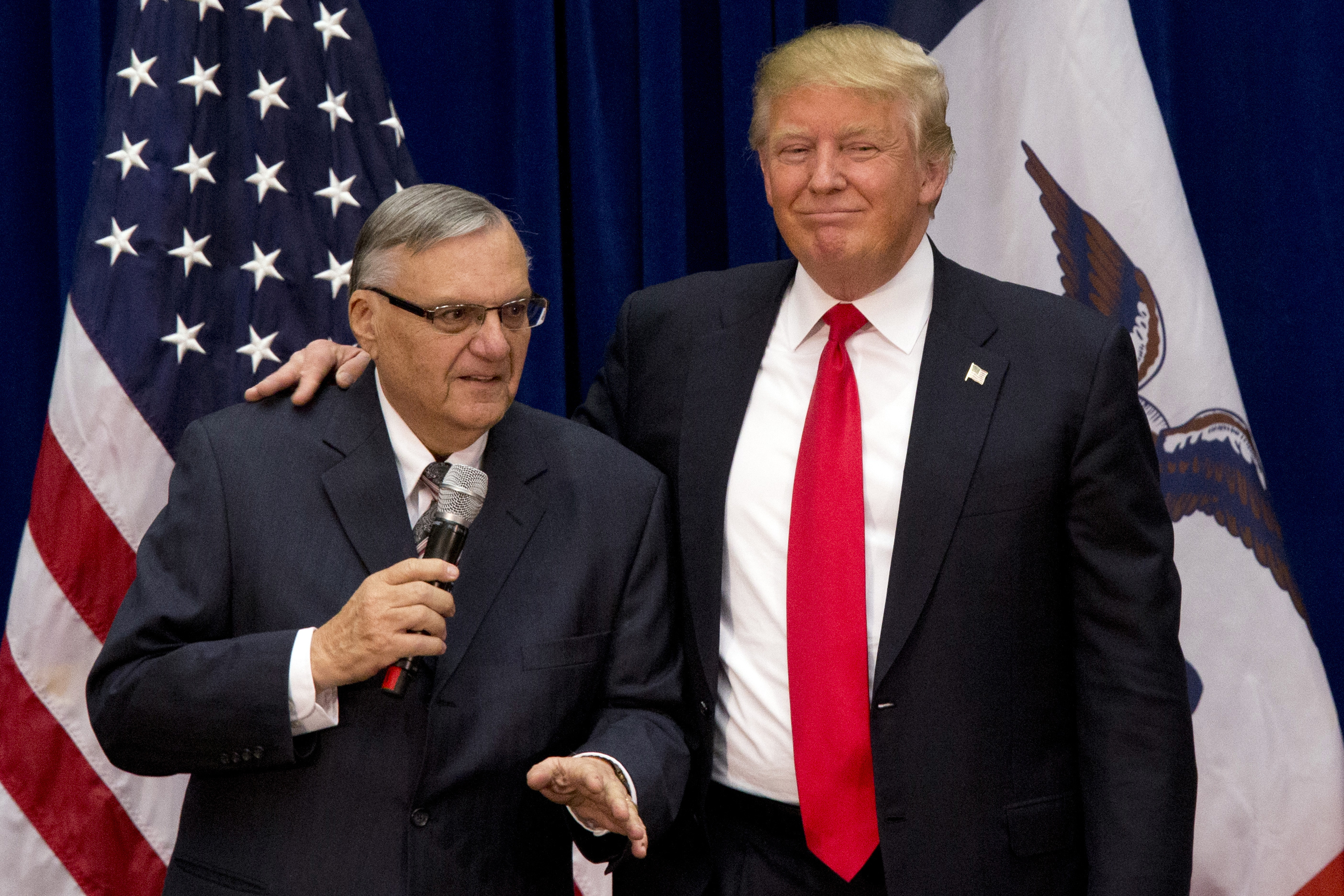What pardoning Arpaio would mean to the worst people in government
As long as you're friends with President Trump, there will be no consequences for breaking the law


A free daily email with the biggest news stories of the day – and the best features from TheWeek.com
You are now subscribed
Your newsletter sign-up was successful
Pardoning Joe Arpaio is one of the worst ideas Donald Trump has ever floated as president.
When Trump took the stage at his insane rally in Phoenix, Arizona, earlier this week, rumors had been swirling that he would use the event to announce a pardon of the former Maricopa County sheriff, who was convicted of criminal contempt of court last month. While the president stopped just short of that, he did indicate that clemency for the ex-sheriff is forthcoming. "Was Sheriff Joe convicted for doing his job?" Trump incredulously asked the crowd. "I'll make a prediction. I think he's going to be just fine, okay?" According to CNN, the White House has already drawn up the necessary paperwork.
There is no legitimate reason for Arpaio to be pardoned. The former sheriff was not "convicted for doing his job," as Trump put it. He was convicted because he deliberately ignored an order from a federal judge to cease his department's racial profiling of Latinos. Arpaio made a name for himself as a "tough" lawman by rounding up suspected undocumented immigrants and humiliating detainees in his inhumane "Tent City" outdoor jail. While his department was focused on immigration enforcement and Arpaio's public image, it left other crimes — including sex offenses — uninvestigated.
The Week
Escape your echo chamber. Get the facts behind the news, plus analysis from multiple perspectives.

Sign up for The Week's Free Newsletters
From our morning news briefing to a weekly Good News Newsletter, get the best of The Week delivered directly to your inbox.
From our morning news briefing to a weekly Good News Newsletter, get the best of The Week delivered directly to your inbox.
Arpaio is also unrepentant. His legal defense was that he simply didn't know about the court order, insisting that it "slipped through the cracks." That laughable argument was contradicted by testimony from his officers and Arpaio's own public statements. When Trump first floated the idea of a pardon earlier this month, Arpaio told Fox News that he would gladly accept it "because I am 100 percent not guilty."
Trump's reasons for wanting to pardon Arpaio are, as you might expect, awful. Arpaio is a political crony of Trump's and shares the president's draconian views on immigration. Pardoning him has nothing to do with justice and everything to do with burnishing his hardline immigration stance while also making liberals mad. It would be a clear case of pardon-power abuse.
Pardoning Arpaio would also send the worst possible message to immigration enforcement agencies. Every lawless act Arpaio committed against Latinos — undocumented immigrants and legal residents alike — would get retroactive sanction from the highest levels of the government. Trump would be signaling that officials who commit the sort of abuses Arpaio committed will be protected by federal authorities in the name of "law and order" and national security. "Is there anyone in local law enforcement who has done more to crack down on illegal immigration than Sheriff Joe?" Trump asked recently. "He has protected people from crimes and saved lives. He doesn't deserve to be treated this way."
The potential for abuse under this scenario is extremely high. Trump has already removed restraints on Immigration and Customs Enforcement, and the agency has quickly spiraled out of control — ICE agents are targeting churches, hospitals, and schools to round up and deport non-criminal undocumented immigrants. The administration also plans to expand the number of so-called 287(g) partnerships that empower local police agencies to act as immigration enforcement officials and, according to civil liberties groups, encourage illegal racial profiling. (Joe Arpaio's own 287(g) agreement was terminated in 2011 due to his unrepentant profiling.)
A free daily email with the biggest news stories of the day – and the best features from TheWeek.com
If Trump pardons his buddy Arpaio, it would send a signal that harsh and illegal treatment of undocumented immigrants would be not just excused, but celebrated by the White House. And you'd better believe that there are more than a few Arpaios-in-waiting who would do anything to steal a slice of Trump's political spotlight.
This is the same rotten mindset that let the people responsible for the Bush-era torture regime escape any real accountability for their flagrant abuses and lawbreaking. The officials who designed and implemented the program were given assurances that they'd be protected by the government, and what resulted was a brutal and slipshod nightmare. When those abuses came to light, no consequences were sought because politicians were unwilling to punish people who were acting in the interest of "national security."
This sort of thinking is exactly backwards — those tasked with law enforcement and security duties should be held to higher standards of accountability precisely because they wield so much power. By pardoning Arpaio, Trump would send a clear message that, in the eyes of his administration, there is no line that immigration officials can cross, and that there are no meaningful consequences for breaking the law and violating the rights of immigrants.
Simon Maloy is a political writer and researcher in Washington, DC. His work has been published by The Huffington Post, The American Prospect, and Salon.
